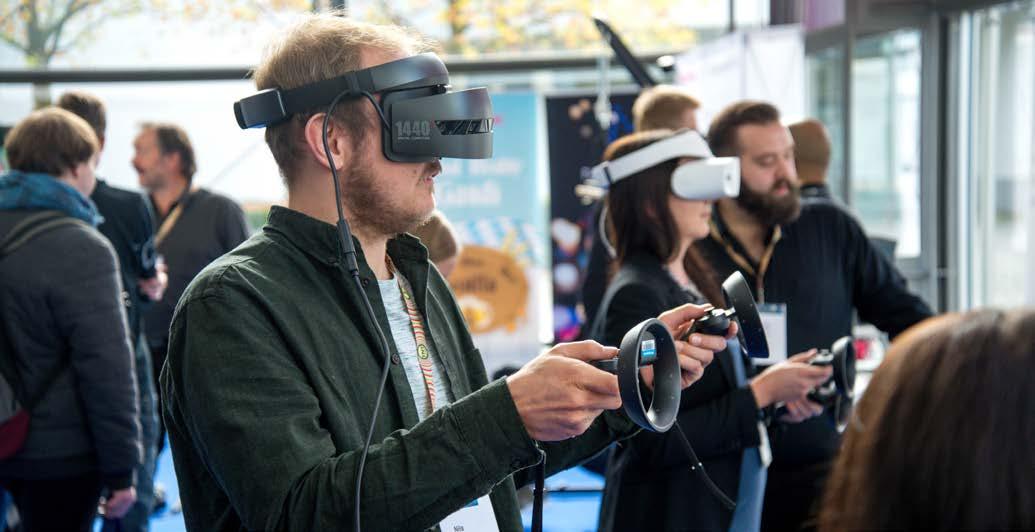
4 minute read
FUTURE FOCUS
The future of event technology
Covid-19 has sped up technological innovation and adoption across the event industries globally, with a focus on enhancing both virtual and hybrid event spaces.
Mike Lysko, founder and chief executive officer of Flock Eventing Platform said: “The global pandemic has fast-tracked the adoption of technology in the event industry in a bid to provide people with a way to communicate safely and efficiently, despite global health concerns.
“One thing is for sure - technology and innovation is likely to remain a cornerstone of the ever-changed event industry,” he said.
Mr Lysko takes us through a few of the existing and emerging event tech advancements making waves in the industry.
1. Virtual experiences and chat rooms
Chat and Q&A functions are one of the top three features attendees want from virtual events. Being able to connect with other guests is part of what makes live events so valuable and what people tend to miss most when attending virtual conferences.
“It’s essential to create online environments that enable truly authentic virtual interactions that foster actual connections,” Mr Lysko said.
2. Translation technology
One of the many merits of hosting virtual and hybrid events is the potential to tap into the global market and reach more international delegates. In-app electronic translations will make events more accessible to people connecting from different countries who speak different languages.
“As this type of technology is streamlined it will become better at capturing the nuances of certain languages and even perhaps speak as well-known spokespersons,” Mr Lysko said.
3. Voice command technology
People are steadily moving towards a contact-and-effortless way to obtain their information. Voice command technology allows attendees to ask a simple question such as “When is the next seminar?” Event planners may program the voice command tech to make suggestions based on the activities and preferences of the delegates and by doing so, increase engagement.
Mr Lysko explained that in the future we are likely to see event voice assistance or voice concierges become an essential component in online and hybrid events, guiding attendees through an event.
4. Virtual Reality (VR) and Augmented Reality (AR) at events
Virtual and augmented reality will become an essential tool in the event industry. These tools will allow attendees to immerse themselves in an event space or completely understand and dissect products through VR and AR headsets.
As VR and AR becomes more advanced it will likely become an event staple and attendees will not only attend events to engage with their favourite brands, but visit an event for a truly unforgettable experience.
Computerising an event to enable the use of this technology is currently rather costly, but as the tech advances it will become a lot more cost-effective. Event professionals will use VR and AR to create unforgettable moments between attendees and brands.

5. Increased engagement through Artificial Intelligence (AI)
AI tools are able to simplify and assist event planners create content that starts conversations and keeps attendee interaction high.
Implementing AI is a great way to begin a conversation and keep it going. For example, chatbots create prompts or facilitate conversations with event attendees or even enhance networking by matching attendees based on shared interests.
In the future we are likely to see event planners use AI to create tailored experiences for each attendee based on their information and using AI software to automate each unique experience.
6. Non-fungible tokens (NFTs)
People love to feel like they are part of something and that they have shared in something special. A good example of this is holding on to non-value items such as a ticket stub for the memory associated with an experience.
The digital equivalent of this is nonfungible tokens (NFTs). NFTs have largely been used as virtual credits for virtual assets in blockchain games. However, they are now becoming virtual event tickets or virtual experience memorabilia. The fact that NFTs use blockchain means that each token is authenticated, verifiable and has value.
NFTs are likely to become part of the event industry by providing attendees with an experience badge or online experience snippet.
7. Managing event data securely
Cyber security standards drive awareness and safeguard people’s personal information. Event planners are starting to realise the importance of protecting this valuable information and the responsibility of managing it securely.
Digital hygiene will become a prerequisite for all those attending events with digital components in the future. Mr Lysko expanded on this point, “Those who do not realise the importance of data protection will unfortunately not be able to participate in the online event space, especially as more people become aware of the dangers of sharing information with people and organisations who do not take data protection and security seriously.”
The future is now
The fast-changing event space requires event professionals to embrace event tech, especially if they wish to remain relevant and in demand. This statement should not scare event professionals but excite them as the changing industry presents ample opportunities.
Who is Mike Lysko?

Mike Lysko is the chief executive officer and founder of Flock, an online eventing platform that makes it easy to build websites, mobile apps and engagement tools – without any previous coding experience. He has been an entrepreneur from a young age and started his first events business whilst obtaining a BCom degree. Mike has experience in all areas of business having managed multiple teams across operations, business development and sales, software development, marketing and customer support. He founded Flock in 2013, which has assisted over four hundred customers across 36 countries in numerous industries including IT, finance, tourism, and pharmaceutical, amongst others. Mike loves events and technology, but when he is not at his desk you may find him at his turntables mixing and producing music or hiking and discovering new trails.










